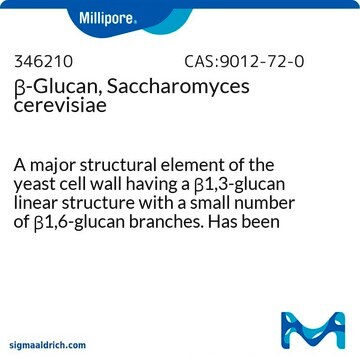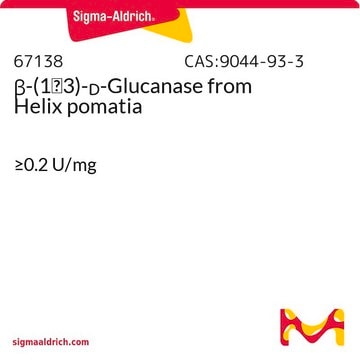G5011
Glucan from baker′s yeast (S. cerevisiae)
≥98.00%
Synonym(s):
Glucosan
Sign Into View Organizational & Contract Pricing
All Photos(3)
About This Item
Recommended Products
biological source
bakers yeast (S. cerevisiae)
Quality Level
Assay
≥98.00%
form
powder
color
white to faint yellow
solubility
water: 9.80-10.20 mg/mL, turbid, colorless to light yellow
storage temp.
2-8°C
Looking for similar products? Visit Product Comparison Guide
General description
Glucan is a natural polysaccharide. They are carbohydrates forming structural components, which is found in the cell walls of yeast, fungi, seaweed and cereals.
Application
Glucan from baker′s yeast (S. cerevisiae) has been used:
- for immune stimulation
- to stimulate mRNA expression of a sigma class glutathione S-transferase (GST) in hemocytes
- to study its effects in rainbow trout intestinal epithelial cell line (RTgutGC)
Biochem/physiol Actions
Glucan enhances anti-infectious immunity, prevents cancer growth, lowers stress and reduces cholesterol level. It has immunostimulatory property. It maintains blood sugar level and rejuvenates skin.
Preparation Note
Prepared by the method of Bacon, et al.
Other Notes
To gain a comprehensive understanding of our extensive range of Polysaccharides for your research, we encourage you to visit our Carbohydrates Category page.
Storage Class Code
11 - Combustible Solids
WGK
WGK 3
Flash Point(F)
Not applicable
Flash Point(C)
Not applicable
Personal Protective Equipment
dust mask type N95 (US), Eyeshields, Gloves
Certificates of Analysis (COA)
Search for Certificates of Analysis (COA) by entering the products Lot/Batch Number. Lot and Batch Numbers can be found on a product’s label following the words ‘Lot’ or ‘Batch’.
Already Own This Product?
Find documentation for the products that you have recently purchased in the Document Library.
Customers Also Viewed
Sequence features, expression profiles and biochemical characteristics of a sigma class glutathione S-transferase gene (AiGSTsigma) from bay scallop Argopecten irradians
Wang M, et al.
Invertebrate survival journal , 15(1), 19-30 (2017)
Simone J C F M Moorlag et al.
Cell reports, 31(7), 107634-107634 (2020-05-21)
β-glucan is a potent inducer of epigenetic and functional reprogramming of innate immune cells, a process called "trained immunity," resulting in an enhanced host response against secondary infections. We investigate whether β-glucan exposure confers protection against pulmonary Mycobacterium tuberculosis (Mtb)
Jeyachandran Sivakamavalli et al.
Journal of molecular recognition : JMR, 29(5), 186-198 (2015-12-22)
In invertebrates, the prophenoloxidase (proPO) pathway is involved in the phenol-like antioxidant production against invading pathogens. Overproduction of melanin and phenolic substances leads to the disruption of hemocytes (own host cells); therefore, there is a prerequisite to regulate the antioxidant
Antonella Torosantucci et al.
The Journal of experimental medicine, 202(5), 597-606 (2005-09-09)
To generate a vaccine to protect against a variety of human pathogenic fungi, we conjugated laminarin (Lam), a well-characterized but poorly immunogenic beta-glucan preparation from the brown alga Laminaria digitata, with the diphtheria toxoid CRM197, a carrier protein used in
A novel LRR and Ig domain-containing protein could function as an immune effector in Crassostrea gigas
Wang X, et al.
Fish & Shellfish Immunology (2019)
Our team of scientists has experience in all areas of research including Life Science, Material Science, Chemical Synthesis, Chromatography, Analytical and many others.
Contact Technical Service









